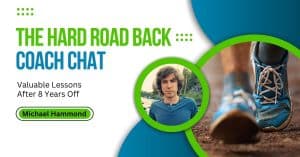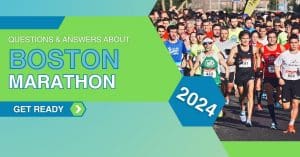Ben Rosario is the head coach of the HOKA Northern Arizona Elite. His athletes have been wildly successful in recent years, with the most notable being Aliphine Tuliamuk’s win at the 2020 US Olympic Trials. His athletes Stephanie Bruce and Kellyn Taylor also finished in the top ten of that race, and on the men’s side, Scott Fauble, a 2:09 marathoner, came in 12th.
In this episode, Coach Claire talks to Ben about the Olympic Marathon Trials, focusing on how well his female athletes did, how HOKA NAZ treats female athletes, especially in light of the Nike Oregon Project, and why he thinks so many female runners are still posting PRs well into their 30s. Ben also shares some great coaching advice, his training philosophy, and his insight into why so many world records have been posted during COVID.
At the time of this recording, Ben was preparing for The Marathon Project held on December 20. Coach Claire asks Ben for his predictions and will post the results here in the show notes following the race.
Like many coaches, Ben started out as an accomplished runner himself as a member of the Hansons Brooks team and he competed in the Olympic Trials twice before turning to coaching full time.
In his six+ years with Northern Arizona Elite, Ben’s athletes have won U.S. National Titles in cross country and on the roads at 10k, the half marathon and the 25k, as well as New Zealand National Titles on the track and the roads.
HOKA NAZ Elite athletes have recorded 8 top-10 finishes at World Marathon Majors.The team has been represented at the World Cross Country Championships, the World Half Marathon Championships, and at the World Track and Field Championships.
His athletes have also competed at the European Athletics Championships, the Great Edinburgh International XC Meet, the NACAC Cross Country Championships, the NACAC Track Championships, the Pan American Cup Cross Country Meet and the Pan American Games.
In 2016, the team produced two sixth-place finishes at the Olympic Trials Marathon and two fourth-place finishes in the 10,000 meters at the Olympic Track and Field Trials. At the 2020 Olympic Marathon Trials, four HOKA NAZ Elite athletes posted top 20 finishes, including three in the top eight in the women’s race led by Aliphine Tuliamuk–the Trials Champion.
Questions Ben is asked:
4:19 2020 has been pretty crazy for everyone in the world but specifically for the team that you lead, Northern Arizona Elite. Let’s go back in time to February when you were getting ready for the Olympic Marathon Trials in Atlanta. Can you take us back there and recap what you were thinking?
5:10 Atlanta is a pretty tough course with all the hills. Obviously that was not a problem for at least your female athletes.
5:28 Your athlete, Aliphine Tuliamuk, won the women’s race and was planning to head to Tokyo when the world shut down. What was that like as her coach?
6:41 I would love to talk to you about Aliphine Tuliamuk’s recent announcement that she is pregnant and due in January. As her coach, I’m sure she came to you and said, “Hey, Ben, this is what I’m going to do.” What was that conversation like?
7:26 How tough was it keeping Aliphine’s pregnancy a secret?
8:33 You are quite experienced in elite mom runners. Several women on your team are moms and are still just killing it. I would love to talk about Kellyn Taylor, Stephanie Bruce. I would love to talk about Stephanie for a minute. She is almost 37 years old and still getting PRs in the 10K. How is that possible?
10:14 It didn’t used to be so long ago that mid-30s was old for a runner but now that’s not the case, and I think maybe it has something to do with belief, too, seeing all these new great examples.
11:06 I want to keep going back to the women because you have been coaching some really great ones obviously, and American women are seeing a resurgence in endurance running. American men maybe not so much. Would you want to talk about that?
12:32 I want to talk to you about how women are treated in this sport. We’ve all heard about the crazy things with the Nike Oregon Project and how Kara Goucher was treated when she was pregnant. I don’t think that it’s going to be the same story with Hoka. I would love to have you share what you could say about how Hoka supports its female athletes.
15:06 I think you’re right that when all that came out about the Oregon Project that we thought as fans, “Oh. This is the way they’re all treated.” But it’s great to hear that that’s not the case.
15:34 Whenever I get a coach on, I love to talk about coaching advice to hopefully help someone who’s listening become a better runner. Do you have different training approaches for the kids who come straight out of college than you do for your veteran elite runners?
17:03 Let’s talk in a little bit more detail about the training advice. Most runners get the advice hard days are hard; easy days are easy. But then you throw in some medium days. I think that’s where a lot of recreational runners trip up is those medium days. Can you talk about those and what they’re for and how you use them?
19:22 You don’t always have to run your hardest, right?
20:11 You’re also a fan of high mileage and I want to know what that means to you because as runners we all want to run as much as possible but clearly there’s a point when high is too high. So what is that point? Obviously it’s individual, but how does somebody know what is high for them? Where’s that sweet spot?
22:51 Besides your athletes, this year we’ve seen so many world-record breaking performances in 2020, which seems counterintuitive since there have been so few races, the world is not normal, and people can’t train the way they usually do. What do you attribute that to?
24:14 I’m sure the cynics would say the number of world-record breaking performances in 2020 are because of the shoes or because there’s not enough drug tests in COVID. What do you say about those kinds of things?
25:25 So you think there should be regulations on running shoes like them being available to the public or there’s a stack height, that kind of stuff; is that what you mean?
27:00 What’s next for you and your athletes? How do you predict the running world will change in 2020?
28:29 This will probably air after the Marathon Project this weekend, but I would love to have you handicap it a little bit, tell us who’s all racing and what do you predict?
31:40 How many participants are there for the marathon?
Questions I Ask Everyone:
32:17 If you could go back and talk to yourself when you started running, what advice would you give?
33:31 What is the greatest gift running has given you?
33:56 Where can listeners connect with you?
Quotes by Ben:
“I think what we’re learning is that women can run really well into their mid-to-late 30s, and we’re learning that not only from Steph but Shalane, Des, Kellyn, Molly Huddle; all kinds of women in the US and beyond are showing that in distance running, women keep getting better.”
“In general, my goal anyway is to keep people around here for a really long time. So we’re definitely taking a long-term approach and we’re not trying to necessarily throw everything at them right away. We’re trying to slowly add pieces over time, and you see that with the folks who have stayed with us for a long time just getting better and better and better and better, and that’s what we want.”
“I think uninterrupted training leads to great performances for anybody at any level.”
“The sport has a side to it now that is very technological. And so does golf. And so does swimming. And so does baseball, right? And every sport almost. And like all those other sports, we need to make sure that the playing field is fair.”
Take a Listen on Your Next Run
Want more awesome interviews and advice? Subscribe to our iTunes channel
Mentioned in this podcast:
Runners Connect Winner’s Circle Facebook Community
Follow Ben on:








